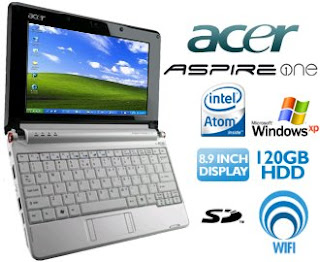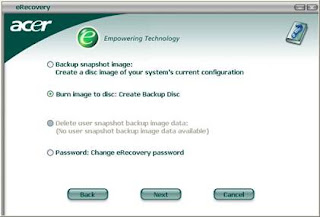
With most netbooks measuring over an inch thick, Acer found another way to improve its best-selling netbook: Make it thinner and lighter while (most important) not raising the price. With the Aspire One (D250-1165), Acer has eliminated a considerable amount of the plastic of its predecessor, the Aspire One (10-inch), making it slightly lighter and only 0.8 inch thick. It's merely an aesthetic overhaul, though; it keeps the original Intel Atom parts and the below-average (89 percent) keyboard. Still, the street price remains constant at $300 ($350 for the six-cell configuration).
Netbook design isn't one of Acer's strengths. The plastic top with a touch of sapphire blue can't compete with the metallic chassis of the HP Mini 2140 and the ASUS EeePC 1002HA. With the Aspire One (D250-1165), Acer opted for thinner and lighter; it's as if they took the One (10-inch) and shoved it into a panini press. The new and improved version measures 10.3 by 7.4 by 0.8 inches (HWD), about 0.3 inch thinner than its predecessor (10.3 by 7.4 by 1.1 inches). It's also thinner than the Samsung N120 (10.7 by 7.4 by 1.2 inches) and the ASUS EeePC 1000HE (10.3 by 7.3 by 1.1 inches), and a tad thinner than the ASUS EeePC 1008HA (Seashell) (10.3 by 7 by 1 inches) and the HP Mini 1000 (10.3 by 6.6 by 0.9 inches).
| |
With the D250-1165, Acer has shaved some weight from the One as well. The new model weighs 2.4 pounds with the three-cell battery and 2.7 pounds when I swapped in a six-cell, though you wouldn't really notice this difference when picking it up. Like most every other netbook, it retains the 10-inch widescreen and the customary 1,024-by-600 resolution. Exceptions include the HP 2140 and the Dell Inspiron Mini 10v, which support resolutions up to 1,366-by-768, and the Dell Inspiron Mini 12 and Samsung NC20 (21GBK), 12-inch netbooks with 1,280-by-800 resolutions.
It would have been more impressive had Acer increased the size of the keyboard, the touchpad, or even the mouse buttons. As it stands, the One's 89 percent keyboard hasn't caught up with its peers, trailing the 92 percent ones of the ASUS 1000HE, the HP 2140, and the Dell Mini 12. Meanwhile, netbooks like the Toshiba NB205 and the Samsung N120 have full-size keyboards, and provide better typing experiences. Acer did, however, incorporate multitouch capabilities (for the first time on the One) into its tiny touchpad, though the gestures are limited to panning and resizing, and they don't always work on the first try. The mouse buttons are also tiny and difficult to press; I had bit of thumb strain after navigating with them for 15 minutes. The 1000HE and the NB205, on the other hand, have bigger and friendlier-to-use mouse buttons, which widen the pinch between your thumb and index finger when you're surfing.
Features, too, remain the same. Like its predecessor, the One (D250-1165) has three USB ports, VGA-out, an Ethernet port, a 1.3-megapixel webcam, 802.11g Wi-Fi, and a 4-in-1 card reader. The 160GB hard drive is spacious enough for most file types. Every other netbook is offering the same capacity, or less. The 1000HE has a couple of extras, like overclocking features and 802.11n support, while the HP 2140 and the Lenovo IdeaPad S10 have ExpressCard slots.
There's really no such thing as raw horsepower on a netbook. The One (D250-1165) performed much the same as other netbooks because it uses the same components—a 1.6-GHz Intel Atom N270 processor, 1GB of memory, and Intel integrated graphics. (About 90 percent of all netbooks on the market come with this combo.) Although the ASUS 1000HE uses a newer N280 (1.66-GHz) Atom processor and a new memory controller, these didn't give it much of a performance edge. As in the previous model, the memory slot on the One (D250-1165) is very easily accessible; removing one screw is all it takes to upgrade to 2GB of memory. This configuration comes with a 23-Wh battery (three-cell), which scored about 3 hours in MobileMark 2007 battery tests. It uses the same battery slot as its predecessor, so the two are able to share batteries. Using its predecessor's 59Wh (6-cell) battery yielded the D250-1165 a battery score of 6 hours 40 minutes.
While some manufacturers increase prices following a design update, Acer has kept the price steady on the Aspire One. It's the most affordable netbook money can buy, which has made it a best-seller. And now with the Aspire One (D250-1165), it's slimmer and lighter. If its inferior typing and navigating experience is a deal breaker for you, spend $50 more for the ASUS EeePC 1000HE, the current Editors' Choice for netbooks.
Check out the Acer Aspire One (D250-1165)'s performance test results. (source : www.pcmag.com)


















.jpg)





